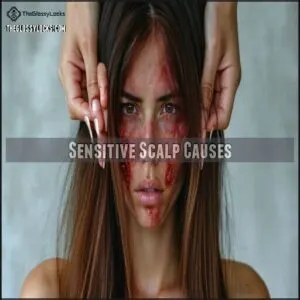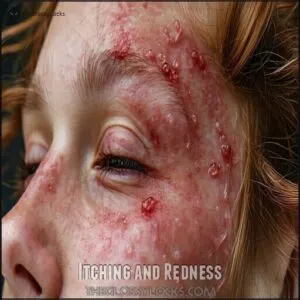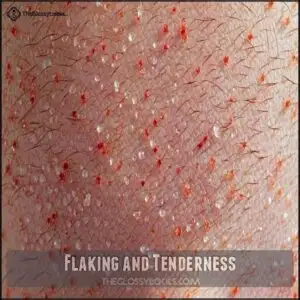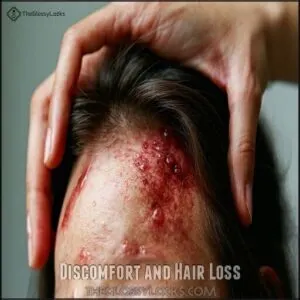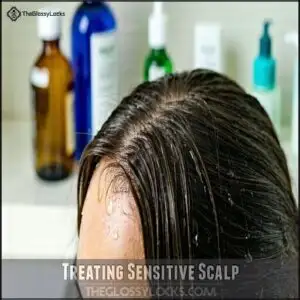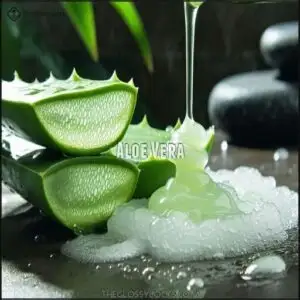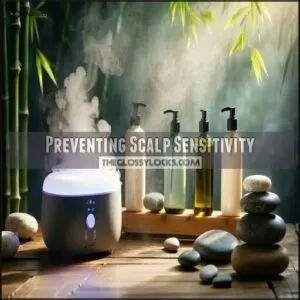This site is supported by our readers. We may earn a commission, at no cost to you, if you purchase through links.

Choose fragrance-free, sulfate-free shampoos and wash with lukewarm water—hot water strips natural oils.
Limit washing to 2-3 times weekly to maintain your scalp’s protective barrier.
Apply aloe vera gel or diluted tea tree oil between washes to soothe irritation.
When selecting products, scan ingredients carefully—avoid alcohol, artificial fragrances, and harsh preservatives.
A simple routine often works best, as your sensitive scalp is like a fussy friend who prefers minimal intervention.
The right balance of cleansing and nurturing can transform your scalp’s health without triggering reactions, using a simple routine.
Table Of Contents
- Key Takeaways
- Sensitive Scalp Causes
- Sensitive Scalp Symptoms
- Treating Sensitive Scalp
- Natural Remedies
- 7 Best Shampoos
- Preventing Scalp Sensitivity
- Scalp Care Routine
- When to See Dermatologist
- Maintaining Scalp Health
- Frequently Asked Questions (FAQs)
- What is the best thing for a sensitive scalp?
- What is the best treatment for irritated scalp?
- What causes hypersensitive scalp?
- Why is the skin on my scalp so sensitive?
- Can children have sensitive scalps?
- How does aging affect scalp sensitivity?
- Is scalp sensitivity hereditary?
- Can medications cause scalp sensitivity?
- Do scalp massages help sensitive scalps?
- Conclusion
Key Takeaways
- Choose fragrance-free shampoos and wash with lukewarm water only 2-3 times weekly to maintain your scalp’s protective barrier and prevent stripping natural oils.
- Apply natural remedies like aloe vera gel, diluted tea tree oil, or chamomile between washes to soothe irritation and reduce inflammation without harsh chemicals.
- Identify your specific triggers—whether they’re skin conditions like psoriasis, allergic reactions to ingredients, chemical treatments, or preservatives—to effectively address the root cause of your sensitivity.
- See a dermatologist if you experience persistent itching, severe inflammation, or noticeable hair loss that doesn’t improve with over-the-counter treatments, as these may signal underlying conditions requiring professional intervention.
Sensitive Scalp Causes
Your sensitive scalp might be reacting to skin conditions like eczema, allergic responses to hair products, harsh chemical treatments, or irritating fragrances and preservatives.
You’ll need to identify your specific triggers to find relief, whether it’s switching to gentler products or treating an underlying condition, which can help alleviate issues related to harsh chemical treatments.
Skin Conditions
Many skin conditions can wreak havoc on your scalp’s comfort.
Psoriasis triggers include stress and infection, causing itchy, red patches with silvery scales. Eczema flare-ups create dry, inflamed areas that can crack and weep.
Various dermatitis types affect different people, while folliculitis causes painful, pimple-like bumps.
Autoimmune effects like alopecia areata trigger both sensitivity and hair loss, making proper sensitive scalp care essential to address conditions like psoriasis.
Allergic Reactions
Struggling with unexplained scalp discomfort? Your hair products might be triggering allergic reactions on your sensitive skin.
When your immune system overreacts to ingredients, it causes inflammation and irritation.
Common scalp allergens include:
- Synthetic fragrances in conventional shampoos
- Preservatives like methylisothiazolinone
- Dyes and colorants in hair products
- Protein derivatives and plant extracts.
Identifying allergens through patch testing helps determine reaction severity.
For relief, try fragrance-free shampoo, hypoallergenic scalp products, and antihistamine use during flare-ups.
Chemical Treatments
Almost every chemical treatment you undergo—hair coloring, relaxers, and perms—strips your scalp’s natural oils and disrupts its protective barrier.
This damage often leads to sensitivity that can last for weeks.
Professional application reduces risks, but even salon treatments contain harsh chemicals.
Consider treatment alternatives like henna for coloring or explore damage repair products specifically formulated for chemically-treated hair.
Home remedies like coconut oil can help soothe allergies caused by product ingredients.
Patch-testing can help avoid adverse reactions to new products.
Fragrances and Preservatives
Hidden allergens in your haircare can trigger serious scalp reactions. Fragrances and preservatives rank among the most common culprits causing sensitivity.
You’ll want to practice careful label reading when selecting products.
- Look for fragrancefree shampoo options that eliminate synthetic scents
- Choose parabenfree shampoo to avoid common preservative irritants
- Select sulfatefree shampoo formulas with ingredient alternatives or safe synthetics instead of harsh detergents
Sensitive Scalp Symptoms
You’ll spot a sensitive scalp through symptoms like itching, redness, flaking, burning sensations, or tenderness that can range from mild irritation to severe discomfort.
These symptoms often signal an underlying issue such as product reactions, skin conditions, or environmental factors that you’ll need to address to restore your scalp’s health.
Itching and Redness
Itching and redness are classic warning signs of a sensitive scalp.
When your scalp becomes inflamed, you’ll feel the urge to scratch, which only worsens symptom triggers.
This inflammation severity can range from mild irritation to angry, bright redness.
Your scalp may feel hot to touch, indicating underlying issues that need attention.
Various associated conditions like allergies or product reactions can trigger these uncomfortable symptoms, making scalp redness relief essential for comfort.
Flaking and Tenderness
Flakes on your scalp often accompany tenderness, creating a double discomfort.
Your scalp may feel warm to the touch, with pain threshold lowering when you brush or touch affected areas.
Flake severity ranges from mild dandruff to thick, crusty patches.
Tenderness location typically concentrates where flaking is worst.
For sensitive scalp experiencing these symptoms, gentle scalp tenderness management and dry scalp remedies become essential to restore comfort and address tenderness.
Discomfort and Hair Loss
Untreated scalp sensitivity can evolve from minor discomfort to significant hair loss over time.
Your scalp irritation might be silently damaging your hair follicles beyond just surface-level discomfort.
- Chronic scalp inflammation weakens follicles, potentially triggering various hair loss types including traction alopecia and telogen effluvium
- The psychological impact of persistent scalp discomfort often creates stress that further accelerates shedding
- Scratching inflamed areas damages hair roots and prevents proper growth cycles
This reorganization aims to enhance readability by grouping related concepts and visually separating them for clarity.
Treating Sensitive Scalp
You’ll find relief from your sensitive scalp with the right medical treatments, including targeted antifungal agents and antibiotics that address the root causes of your discomfort.
These effective solutions work directly to eliminate infections and reduce inflammation, helping restore your scalp’s natural balance.
Antifungal Agents
Antifungal agents serve as powerful allies in your battle against scalp sensitivity caused by fungal infections.
When Malassezia yeasts trigger seborrheic dermatitis, ingredients like ketoconazole and tea tree oil can substantially reduce symptoms.
These treatments come in various forms—shampoos, creams, and oral medications—each targeting specific scalp conditions.
For persistent scalp sensitivity, antifungal treatments may require consistent use, as stopping too soon can lead to resistance development.
Remember, some products may cause side effects, so pediatric use requires extra caution.
Consistent use of fragrance-free shampoos can also alleviate scalp irritation.
Antibiotics
While antifungal treatments target yeast-related conditions, antibiotics become necessary when bacteria cause scalp infections.
Your doctor may recommend:
- Topical antibiotics like Neosporin for mild scalp folliculitis
- Antibacterial soaps for cleansing affected areas, particularly along the hairline
- Oral antibiotics such as doxycycline for severe bacterial scalp infections
- Sulfacetamide shampoos that combine antibiotic action with dandruff control
- Combination treatments for conditions like perifolliculitis capitis
Remember, antibiotic resistance can develop with overuse, so always follow your healthcare provider’s instructions precisely when treating scalp inflammation or dermatitis.
Natural Remedies
You’ll find relief for your sensitive scalp without harsh chemicals by turning to nature’s medicine cabinet.
Plants like aloe vera, tea tree oil, and chamomile can soothe inflammation and reduce irritation while providing gentle healing that won’t strip your scalp’s natural balance, promoting a concept of natural balance.
Aloe Vera
Aloe vera consistently proves itself as nature’s remedy for irritated scalps.
You can directly apply pure aloe gel to your sensitive skin or choose shampoos containing this soothing ingredient.
Its anti-inflammatory properties calm redness while providing gentle hydration without side effects.
Discover various aloe options online.
For maximum scalp soothing benefits, leave it on for several minutes before rinsing.
Like a cool drink for your parched scalp, aloe offers natural scalp care that truly delivers, providing a sense of gentle hydration and acting as a soothing ingredient.
Tea Tree Oil
Tea tree oil, a powerhouse for sensitive scalps, offers natural relief with its antifungal and antibacterial properties.
You’ll find TTO benefits particularly effective against scalp irritation when added to your shampoo or diluted as a direct application.
Research supports TTO’s effectiveness, but be mindful of concentrations—always dilute it properly to avoid potential side effects.
This soothing scalp treatment works wonders for irritated scalps when used consistently.
Chamomile
Chamomile’s gentle anti-inflammatory properties make it a powerhouse for irritated scalp relief.
When applied topically, this natural remedy calms itching and reduces inflammation that often plagues sensitive skin.
You’ll find chamomile in many sensitive skin shampoo formulations where it works to soothe your scalp without harsh side-effects.
Chamomile oil can also reduce inflammation, and for maximum benefits, look for products combining chamomile with other soothing ingredients for thorough scalp care and lasting comfort with gentle care.
7 Best Shampoos
You’ll find relief for your sensitive scalp with these carefully selected shampoos that avoid harsh ingredients while still getting your hair clean.
These seven options are specifically formulated to soothe irritation and prevent flaking, giving you both comfort and confidence.
1. Vanicream Gentle Shampoo Sensitive Scalp

In the area of sensitive scalp solutions, Vanicream Gentle Shampoo stands out as a dermatologist-tested, fragrance-free option that’s truly earned its reputation.
This pH-balanced formula works effectively to clean both hair and scalp while removing flaking and controlling oil buildup.
You’ll appreciate that it’s free from common irritants like dyes, fragrances, lanolin, parabens, and formaldehyde releasers.
While some users report needing a conditioner afterward to prevent tangling, most praise how it alleviates itching and dryness, and it’s especially beneficial for those with eczema or allergies seeking a chemical-free option.
Best For: Individuals with sensitive scalps, allergies, or conditions like eczema who need a fragrance-free, chemical-free shampoo.
- Dermatologist-tested, pH-balanced formula suitable for sensitive scalps.
- Free from dyes, fragrances, lanolin, parabens, and formaldehyde releasers.
- Effectively cleans scalp, controls oil, and reduces flaking and build-up.
- May leave hair feeling dry or tangled without a conditioner.
- Less suitable for those seeking highly moisturizing or conditioning effects.
- Some customers report shipping delays when purchasing online.
2. Briogeo Aloe Oat Milk Shampoo
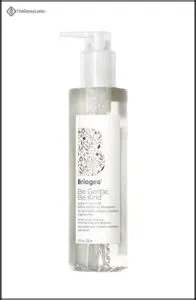
Anyone struggling with scalp sensitivities will appreciate Briogeo’s Aloe Oat Milk Shampoo. This hypoallergenic formula is completely free from fragrances and essential oils, making it perfect if you’re prone to reactions.
It’s dermatologist-approved and contains soothing aloe vera and oat milk that work together to hydrate your scalp while fighting microbes that cause irritation.
The 97-99% naturally-derived formula is vegan and cruelty-free, without lactose, soy, or gluten. It’s like giving your sensitive scalp a gentle hug while still getting your hair thoroughly clean.
Best For: Individuals with sensitive scalps or allergies to fragrances, essential oils, soy, lactose, or gluten.
- Hypoallergenic and fragrance-free, reducing the risk of irritation.
- Contains aloe vera and oat milk for hydration and soothing benefits.
- Vegan, cruelty-free, and made with 97-99% naturally-derived ingredients.
- Some users may experience dryness if not paired with a conditioner.
- May not be effective for individuals with very oily hair.
- Packaging can be difficult to use due to the stiff bottle design.
3. Aveeno Rose Chamomile Shampoo Hydrating
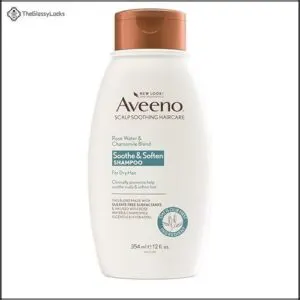
If you’re struggling with scalp sensitivity, Aveeno Rose Chamomile Shampoo Hydrating steps up to the plate with its gentle yet effective formula.
This clinically proven shampoo soothes irritated scalps while softening your hair, thanks to its star ingredient—oat—which leads the ingredient list.
Infused with rose water and chamomile specifically for sensitive skin, this sulfate-free, dye-free, and paraben-free formula cleanses without stripping essential moisture.
For enhanced relief, consider shampoos with dandruff-fighting actives.
You’ll appreciate how it balances cleansing with hydration from root to tip, enhancing your hair’s natural beauty without harsh chemicals, and it’s never tested on animals, either.
Best For: People with sensitive scalps or those looking for a gentle, hydrating shampoo free from harsh chemicals.
- May not address specific scalp conditions like dandruff.
- Hydration might not be sufficient for extremely dry hair.
- Fragrance from rose water and chamomile could be overwhelming for some.
- Soothes irritated scalp with clinically proven ingredients.
- Free from sulfates, parabens, and dyes, making it safe for sensitive skin.
- Enhances natural hair beauty while providing hydration from root to tip.
4. Christophe Robin Sea Salt Scrub Detox
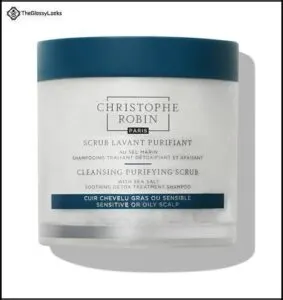
This unique Christophe Robin Sea Salt Scrub Detox offers double benefits for sensitive scalps.
Unlike traditional shampoos, it works as both a detoxifier and exfoliant, gently removing product buildup while rebalancing oily scalps.
The natural sea salt crystals combined with sweet almond oil calm irritation caused by chemical treatments.
You’ll notice your hair feels silky and clean after use, though you might want to follow with a conditioner as it can be slightly drying.
While it’s pricier than average, most users find it’s worth the investment for its effectiveness—90% reported successful removal of daily buildup.
Best For: Those with sensitive or oily scalps seeking a deep-cleaning solution to remove buildup and rebalance oil production.
- Gently detoxifies and exfoliates the scalp with natural sea salt crystals.
- Leaves hair feeling silky, clean, and shiny with long-lasting freshness.
- Effective for reducing itchiness and irritation caused by treatments.
- Can cause temporary dryness requiring a follow-up conditioner.
- Expensive compared to traditional shampoos.
- Difficult to work through long or thick hair without additional shampoo for ends.
5. Fragrance Free Shampoo Sensitive Skin
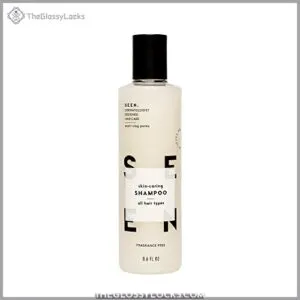
The SEEN Fragrance Free Shampoo is a sanctuary for sensitive scalps.
Developed by a Harvard-trained dermatologist, this sulfate-free formula creates a luxurious lather without irritating your skin.
It’s completely free of fragrances, sulfates, silicones, parabens, and pore-clogging oils—making it ideal for those with sensitive or acne-prone skin.
The formula contains hemisqualane and bisabolol to smooth hair and reduce frizz while maintaining scalp health.
Though pricier than some alternatives, many users report it’s worth the investment for relief from itching and irritation.
Best For: Those with sensitive, acne-prone, or eczema-prone skin seeking a gentle, fragrance-free shampoo.
- Dermatologist-developed, non-comedogenic formula is safe for sensitive skin.
- Luxurious lather without sulfates, silicones, or pore-clogging oils.
- Smooths hair and reduces frizz with hemisqualane and bisabolol.
- Higher price compared to some alternatives.
- May require periodic breaks or clarifying shampoo to avoid buildup.
- Some users experience greasy scalp and dry hair after prolonged use.
6. Kristin Ess Gentle Sensitive Shampoo
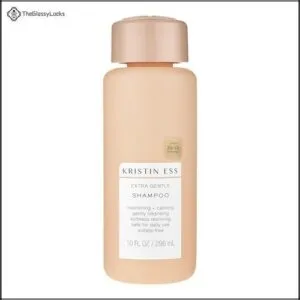
For those with sensitive scalps, Kristin Ess Gentle Sensitive Shampoo offers a sulfate-free solution that won’t trigger irritation.
This vegan, cruelty-free formula cleanses your hair without stripping natural oils, leaving it soft and shiny. The unique Zip-Up Technology strengthens weak areas while protecting from environmental damage.
You’ll appreciate its subtle blend of pear water, violet, and sandalwood fragrances. Safe for daily use and color-treated hair, this USA-made product has earned praise for reducing frizz and improving texture, though some users report occasional dryness.
It’s an excellent choice if you’re battling scalp sensitivity, and the benefits include improved hair health with daily use.
Best For: Individuals with sensitive scalps seeking a sulfate-free shampoo that gently cleanses without causing irritation.
- Sulfate-free, vegan, and cruelty-free formula.
- Strengthens hair with Zip-Up Technology and protects from environmental stressors.
- Subtle, pleasant fragrance with daily-use compatibility for color-treated hair.
- Some users report occasional scalp dryness or flakiness.
- Mixed feedback on performance for oily hair.
- May not provide enough hydration for very dry hair.
7. DHS Clear Shampoo Sensitive Scalp
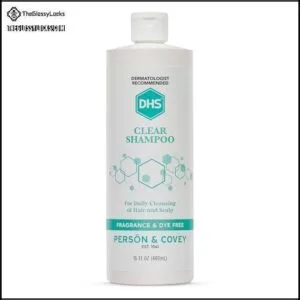
For those with hypersensitive scalps, DHS Clear Shampoo offers a gentle yet effective solution.
This dermatologist-recommended formula maintains your skin’s natural pH balance while being free of fragrances, PABA, and TEA Lauryl Sulfate—common irritants that trigger scalp discomfort.
You’ll appreciate the rich lather that cleanses thoroughly without stripping hair of natural oils.
Many users with conditions like lupus and Sjögren’s report significant relief from itchiness and redness after consistent use.
Though it may take two weeks to see results, this family-owned brand’s commitment to sensitive skin care since 1941 speaks volumes.
Best For: People with hypersensitive scalps or conditions like lupus and Sjögren’s who need a gentle, fragrance-free shampoo.
- Results may take 2 weeks to appear.
- Can leave strands feeling dry or the scalp oily for some users.
- Minor packaging issues like leaks.
- Fragrance-free and suitable for sensitive skin.
- Maintains natural pH balance and reduces irritation.
- Provides significant itchiness and redness relief with consistent use.
Preventing Scalp Sensitivity
You can protect your sensitive scalp by avoiding harsh products with irritating ingredients and reducing how often you wash your hair.
Making simple changes to your hair care routine, like using a humidifier in dry weather and choosing fragrance-free products, will help prevent that familiar itchy, uncomfortable feeling that ruins your day.
Avoiding Irritants
Now that you’ve found your ideal sensitive skin shampoo, protecting your scalp means avoiding common irritants.
Your product ingredients matter more than you might think for irritated scalp relief.
Here are 5 irritants to avoid:
- Sulfates (SLS/SLES) – harsh cleansers that strip natural oils
- Artificial fragrances – leading cause of allergic reactions
- Parabens – preservatives linked to scalp irritation
- Formaldehyde-releasing preservatives – hidden triggers in many products
- Alcohol – drying agents that compromise your scalp barrier
Choose gentle formulas and consider patch testing before fully committing to natural alternatives or a minimalist routine.
Reducing Shampooing Frequency
How often should you wash your hair when dealing with scalp sensitivity? Daily shampooing can strip your scalp of natural oils, worsening irritation.
Try gradually reducing your cleansing frequency to every 2-3 days. Between washes, use dry shampoo or try co-washing with a gentle, fragrance-free conditioner.
For extremely sensitive scalps, water-only washing can help maintain natural oil retention while minimizing exposure to potential irritants, and using a gentle approach is key.
Using Humidifiers
During winter months, your humidifier becomes a secret weapon against scalp dryness.
Maintaining ideal humidity levels (30-50%) helps your scalp retain moisture naturally.
Place a humidifier in your bedroom to combat the effects of indoor heating that strips scalp hydration overnight.
Both cool and warm mist humidifier types work effectively, but remember regular humidifier maintenance prevents mold growth.
This simple lifestyle change offers a reliable dry scalp remedy without requiring additional products, making it a useful dry scalp remedy.
Scalp Care Routine
You’ll need a consistent scalp care routine to keep sensitivity at bay, just like your face deserves daily attention.
Your sensitive scalp will thank you for adopting regular cleansing with gentle products, followed by toning to restore pH balance and occasional exfoliation to remove buildup.
Regular Cleansing
Now that you’ve taken steps to prevent scalp sensitivity, establishing a proper cleansing routine is your next line of defense.
Wash your hair with lukewarm water – not hot – as extreme temperatures can trigger irritation. Consider a gentle scalp cleanser that’s fragrance-free and sulfate-free.
You can find a suitable product online. Cleansing frequency matters too; daily washing might strip natural oils, while too infrequent can lead to product build-up.
A light scalp massage during washing improves circulation without aggravating sensitivity, and following these steps can help maintain a healthy scalp.
Toning and Exfoliating
Your sensitive scalp needs regular toning and exfoliating to remove buildup and maintain balance.
Exfoliation helps clear away dead skin cells while toning prepares your scalp for better product absorption.
For effective scalp care, consider the following:
- Use glycolic acid toners to rebalance and reduce dryness
- Apply exfoliating products with salicylic acid 2-3 times weekly
- Consider natural options like tea tree oil or fruit enzymes for gentle exfoliation
Don’t overdo it—moderation is key! A quality scalp toner can soothe irritation.
Masking and Conditioning
Your scalp craves nourishment through regular masking and conditioning. Apply DIY masks with oatmeal or avocado weekly for a hydration boost to combat scalp sensitivity.
Follow with lightweight scalp oils like jojoba or argan for deep scalp moisturization. Protein treatments strengthen hair follicles, while leave-ins provide ongoing protection.
Quality scalp care products containing aloe vera deliver a soothing scalp treatment between washes, balancing your skin’s natural moisture.
When to See Dermatologist
You’ll need to consult a dermatologist if you’re experiencing persistent itching, severe inflammation, or noticeable hair loss that doesn’t improve with over-the-counter treatments.
Don’t wait until your scalp condition worsens, as early professional intervention can prevent complications and provide relief through prescription-strength solutions customized to your specific needs.
Persistent Itching
If that persistent itch on your scalp hasn’t subsided after two weeks of home remedies, it’s time to see a dermatologist.
Constant scratching creates an itch-scratch cycle that can damage hair follicles.
A professional can identify underlying conditions like psoriasis or seborrheic dermatitis that cause scalp sensitivity. They’ll help with trigger identification and recommend proper symptom management beyond typical itchy scalp solutions you’ve tried at home.
Severe Inflammation
If you’re noticing redness that won’t quit, it’s time for professional help.
Severe scalp inflammation often signals underlying conditions that require medical intervention.
- Inflammation triggers may include autoimmune disorders like psoriasis
- Bright red patches with silvery scales suggest more than temporary irritation
- Swelling, warmth, and extreme tenderness indicate potential infection
- Severe symptoms may worsen despite over-the-counter treatments
Don’t wait until inflammation becomes unbearable—topical corticosteroids from your dermatologist can provide relief when home remedies fail.
Hair Loss
If your hair’s falling out alongside scalp sensitivity, don’t wait to see a dermatologist. Persistent hair loss can signal underlying issues requiring professional treatment.
| Hair Loss Causes | Recommended Action | Timeline to Seek Help |
|---|---|---|
| Genetic Predisposition | Consult for hair regrowth options | Within 3 months of noticing |
| Hormonal Imbalance | Request blood work evaluation | 2-4 weeks of symptoms |
| Nutritional Deficiencies/Stress Impact | Discuss scalp inflammation treatment | After 1 month of home care fails |
The causes of hair loss can be due to Genetic Predisposition, Hormonal Imbalance, or Nutritional Deficiencies/Stress Impact, each requiring a different approach to treatment.
Maintaining Scalp Health
You’ll keep your sensitive scalp happy with daily habits that prevent irritation, including smart diet choices and stress management techniques.
Your scalp’s health directly reflects your overall wellness, so making simple lifestyle adjustments can transform persistent discomfort into lasting relief.
Lifestyle Changes
While a dermatologist can diagnose serious scalp conditions, your daily habits also play a vital role in maintaining scalp health.
Simple lifestyle changes can make a world of difference for your sensitive scalp. Reconsider your sleep positions to avoid friction, and choose looser hairstyles that don’t pull on your scalp.
Shield yourself from environmental factors like harsh sun and pollution with hats or scarves. These small adjustments can substantially reduce scalp sensitivity and irritation, and make a significant impact on your overall scalp health by promoting scalp health.
Dietary Adjustments
Beyond lifestyle habits, what you eat directly impacts your scalp health. Incorporate omega-3 rich foods like salmon and flaxseeds to reduce inflammation.
Antioxidant-packed berries and leafy greens protect against oxidative stress. Don’t forget zinc from pumpkin seeds and biotin from eggs to strengthen hair and heal the scalp.
Meanwhile, cut back on inflammatory foods like processed snacks and excessive dairy that can trigger sensitivity. Proper hydration remains your scalp’s best friend, and reducing inflammation is key to maintaining a healthy lifestyle.
Stress Management
How does your stress level affect your scalp health? When you’re stressed, your body releases hormones that can trigger scalp sensitivity, itching, and flaking. Managing stress is essential for maintaining a healthy scalp.
Here are four effective stress reduction techniques:
- Practice daily mindfulness meditation for 5-10 minutes
- Incorporate regular exercise to release tension
- Improve sleep quality with consistent bedtime routines
- Try progressive muscle relaxation techniques before bed to help with relaxation
Frequently Asked Questions (FAQs)
What is the best thing for a sensitive scalp?
Like a parched garden thirsting for gentle rain, your sensitive scalp needs fragrance-free, sulfate-free shampoos and natural remedies like aloe vera or tea tree oil.
You’ll find relief with fewer washes and hypoallergenic products.
What is the best treatment for irritated scalp?
For an irritated scalp, try gentle, fragrance-free shampoos with aloe vera or tea tree oil.
Apply hydrocortisone cream for inflammation, reduce washing frequency, and consider seeing a dermatologist if symptoms persist.
Cold compresses can soothe discomfort, and using hydrocortisone cream can help with inflammation.
What causes hypersensitive scalp?
Your hypersensitive scalp may result from skin conditions like psoriasis, product allergies, chemical treatments, fungal infections, stress, hormonal changes, tight hairstyles, or environmental factors.
Fragrances and preservatives in hair care products are common culprits.
Why is the skin on my scalp so sensitive?
Your scalp sensitivity may stem from allergic reactions to hair products, skin conditions like psoriasis, hormonal changes, or tight hairstyles.
Environmental factors, chemical treatments, and an imbalanced scalp microbiome can also contribute to this discomfort.
Can children have sensitive scalps?
Yes, children can have sensitive scalps due to their thinner skin, developing immune systems, and reactions to products.
You’ll notice symptoms like itching, redness, or discomfort when washing or brushing their hair, which can be a clear indication of a sensitive scalp issue.
How does aging affect scalp sensitivity?
As you age, your skin becomes thinner with less natural oils, making your scalp more prone to dryness and irritation. You’ll often notice increased sensitivity to products and environmental factors.
Is scalp sensitivity hereditary?
While genetics can play a role in your scalp sensitivity, it’s not always directly hereditary.
You may inherit skin conditions that contribute to sensitivity, but environmental factors and product choices also substantially influence your scalp health, including the impact of scalp sensitivity.
Can medications cause scalp sensitivity?
Certain medications can indeed trigger scalp sensitivity as a side effect.
You’ll notice increased itching, burning, or flaking after starting new prescriptions, particularly those affecting hormones, blood pressure, or containing retinoids.
Do scalp massages help sensitive scalps?
Gentle scalp massages can help sensitive scalps by improving blood circulation and reducing stress. You’ll want to use light pressure and avoid harsh movements that might trigger irritation or discomfort.
Conclusion
Did you know that nearly 60% of people experience scalp sensitivity at some point in their lives?
Remember, effective scalp care for sensitive skin doesn’t require complicated routines—it’s about consistency and gentle products.
By identifying your triggers, choosing fragrance-free options, and establishing a minimalist routine, you’ll transform your scalp health.
When in doubt, consult a dermatologist. Your scalp will thank you for the tender loving care it deserves!

